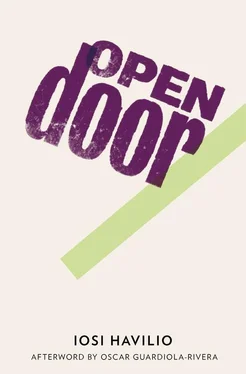I grab the phone again and dial rapidly, without thinking. Eloísa answers, half asleep. I hang up. It might have been her mum, the doubt lingers.
Later, with coffee, the chat flows again, we talk about everything. To tell the truth, he talks, jumping from topic to topic without pause. He’s happy. He tells me about university, about everything he gave up to live for his studies, he mentions Esteban a hundred times, the best friend he’s known since primary school and who he sees every Thursday night, come what may. He lights up when he talks about his father, who died two years ago and left him this little flat, which isn’t the house he would have chosen to live in, but which isn’t bad, it’s enough for him on his own, and the location is unbeatable, everything’s on the doorstep.
My eyes close, Yasky resists, he still has one topic left, his passion for the racetrack. He loves it, he doesn’t miss a single Sunday.
‘But I control myself,’ he cuts himself short. ‘I’m far from an addict.’
Finally he shuts up and I make the most of the pause to shut him up completely.
‘Bernardo,’ I say in a low voice, as if to keep it between the two of us. ‘I’m a virgin.’
His face freezes, he doesn’t get the joke. I seem to have offended him. Yasky arches his eyebrows in a sign of annoyance and starts washing the dishes, charging the atmosphere with a melodramatic silence. He must feel ridiculous because in a minute he gets over it and suggests we see if there are any films on. With the television on, we forget about everything. Me, about Aída, who still hasn’t shown up, and about Eloísa’s hands exploring my body, and life in the country which is starting to drive me insane, and that story about lunatics from a century ago, which intrigues me, I still don’t know why. Yasky must be trying to erase my joke from his mind, which I’m sure will torture him all night.
At about one o’clock, the blank screen barking the apocalyptic noise that marks the end of transmission, we go to sleep in separate rooms, like an old-fashioned marriage.
The Romanians on the ranch have a party every night. They start early, at around half eight, sometimes a bit earlier to prepare the bonfire. Eloísa and I smoke in the storeroom behind the shop, about a hundred metres from where they are. Without meaning to, we fall silent to listen to them, to see what they’re doing. They talk loudly, they sing, they play the guitar, and as the hours slip by some of them become violent, they break bottles, insult each other, or rather they shout things that sound like insults. They almost go insane.
Eloísa tells me that one of the Romanians goes to the shop to buy flour and gin. She says he has a kind face and he’s handsome, if a bit dirty. She asked him his name but as she didn’t understand his reply, he wrote it on a piece of card. Eloísa shows it to me. I read: Loti. Eloísa laughs.
‘Isn’t it a ridiculous name?’
•
Inside the Huret book, folded into four, I found a piece of yellowed paper, stained by time, and written on a typewriter with annotations in the margins.
Inebriation and insanity. By Domingo Faustino Sarmiento. Reading at a meeting of doctors in his house on July 29th, 1884.
Conclusions:
1st — As far as the production or cause of dementia is concerned, the statistics from the dementia hospices are inevitably incomplete.
2nd — The dementia of today is the peculiar condition of an imperfect civilisation.
3rd — The alien population in America vastly increases the number of elements, and acts indirectly as an element, of generation or production of dementia in the native population.
4th — Heredity, whether in relation to physical, intellectual or moral conditions, is of greater importance in the production of dementia than generally supposed.
5th — Poor education, lack of it, or superficial education, increases the number of demented individuals, while on the other hand, a good system of moral and scholarly education has great influence in the prevention of dementia.
6th — Certain occupations are more conducive than others to the development of dementia, whilst lack of occupation is frequently a cause, and on occasion a symptom, of dementias.
7th — Unhealthy marriages increase dementia, and single men, and probably single women too, are more prone to dementia than married couples. Furthermore, marriages between blood relatives are shown, with much uncertainty and in very rare cases, to be the exception to this.
Yesterday one of them committed suicide, Jaime tells me at breakfast, as Boca swings the axe on the other side of the window and Martín piles the wood against the wall of the veranda.
Jaime had gone out on a job with Boca. They had to change the roof tiles of a ranch house on an estate about two hundred kilometres from Open Door. We’re going to spend a few nights there, until we finish the job, said Jaime and asked me whether I was scared to be left alone. Not at all.
An hour after Jaime left, Eloísa appeared, in perfect synchrony, as if she had planned it. She brought a generous fistful of hash that she could barely contain in her hand. There’s enough here to smoke five a day for a week, she said, placing the small mountain of marijuana in a bowl on top of the fridge. It was three in the afternoon, we had to pass the time somehow. Let’s have a bath together, suggested Eloísa. It seemed like a good idea, so I prepared the tub for the two of us while Eloísa rolled the first joint, leaving another ready for later.
I snogged the Romanian in the storeroom, Eloísa tells me casually as she undresses. He’s a sweetie, a really good kisser, she says. Did I tell you that he’s called Loti? Isn’t it funny? Loti, Loti, Loti, she repeats, as if it were a game. I still have no idea how old she is: it’s all the same to me, but it’s strange, sometimes I put her at seventeen, sometimes thirty-five. Eloísa continues to tell me about Loti, gently pinching my bum between sentences. Did you know he’s got a gold tooth?
We spend the whole afternoon in the water, without kissing or anything. Eloísa taught me some new songs by a rock group she’s fanatical about. She sings badly, but I like it. We smoked the joint, and half of the second one, which slipped from my fingers and fell into the water. We laughed a lot, about Jaime, about Boca, about the poseurs who play polo, about the shape of my feet, rather crooked and crablike, and about a load of other nonsense.
I don’t know why it occurred to me to tell her about Aída. To fill a gap, or because I sobered up and it seemed a good moment to confess. Eloísa became serious when I mentioned the bridge. Her seriousness lasted about as long as the fall did, less than a minute. And with her smoke-filled cackles, feeling rather dizzy, I suddenly understood everything: the precision of chance, the cosmic, the inevitable.
The night caught us dozing, still naked, brushing against each other time and again, in Jaime’s bed.
Eloísa lit another joint, our third, and a ferocious hunger attacked us, which we sated by emptying the larder of anything edible: noodles, tuna, breadcrumbs, turrón and birdseed. Then we went back to bed.
‘Do you want me to go down on you?’ asks Eloísa out of nowhere, once we’ve switched off the light.
•
Jaime came in slowly, noiselessly, in the middle of the night. His head appeared first, he was almost on tiptoe. Eloísa was curled up between my legs, under the blanket, barely visible. She was breathing hard, her nose blocked with mucus. Jaime came in slowly, noiselessly, but I saw him out of the corner of my eye. He stayed on the threshold without letting go of the handle, leaning on it, then he disappeared.
Читать дальше












